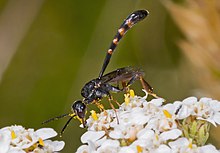| Revision as of 09:54, 26 February 2021 editShortDescBot (talk | contribs)Bots306,872 edits ShortDescBot adding short description "Species of wasp"← Previous edit | Revision as of 22:11, 27 November 2022 edit undoFeralcateater000 (talk | contribs)Extended confirmed users11,023 editsmNo edit summaryNext edit → | ||
| Line 52: | Line 52: | ||
| ] | ] | ||
| ] | ] | ||
| ] | ] | ||
| ] | ] | ||
Revision as of 22:11, 27 November 2022
Species of wasp| This article needs additional citations for verification. Please help improve this article by adding citations to reliable sources. Unsourced material may be challenged and removed. Find sources: "Gasteruption jaculator" – news · newspapers · books · scholar · JSTOR (March 2011) (Learn how and when to remove this message) |
| Gasteruption jaculator | |
|---|---|

| |
| Gasteruption jaculator -Female | |
| Scientific classification | |
| Kingdom: | Animalia |
| Phylum: | Arthropoda |
| Class: | Insecta |
| Order: | Hymenoptera |
| Family: | Gasteruptiidae |
| Genus: | Gasteruption |
| Species: | G. jaculator |
| Binomial name | |
| Gasteruption jaculator (Linnaeus, 1758) | |
| Synonyms | |
| |
Gasteruption jaculator is a species of the family Gasteruptiidae, subfamily Gasteruptiinae.
Distribution
This species is mainly present in Austria, Belgium, Great Britain, Czech Republic, Finland, France, Germany, Greece, Hungary, Italy, Poland, Romania, Russia, Slovakia, Spain, Sweden, Switzerland, in the eastern Palearctic realm, and in the Near East.

Description
The head and thorax are completely black. The head is strongly rounded, the thorax is elongated in a sort of long neck (propleura), which separates the head from the body. Also the abdomen is strongly stretched, broader at the posterior end and placed on the upper chest (propodeum). The colour of the abdomen is black, with reddish-orange rings. The tibiae of the hind legs are club shaped. In the female the ovipositor is usually very long with a white tip. In resting position, these wasps slowly and rhythmically raise and lower the abdomen.
Life cycle
The females of this parasitic wasp lays its eggs by its long ovipositor on the body of larvae of solitary bees or wasps. On hatching its young larvae will devour grubs and supplies of pollen and nectar of its victim. The adults grow up to 10–17 millimetres (0.39–0.67 in) long and can mostly be encountered from May through September feeding on Apiaceae species.
Habitat
Gasteruption jaculator has been found visiting various flowers, or hovering around the nests of solitary bees and wasps in gardens and meadows. The species is commonly found during May to September.
References
External links
- Biolib
- Fauna Europaea
- Treknature
- Ponent at space
- Naturespot
- Los W. (ed.): Fauna Europaea
| Taxon identifiers | |
|---|---|
| Gasteruption jaculator |
|